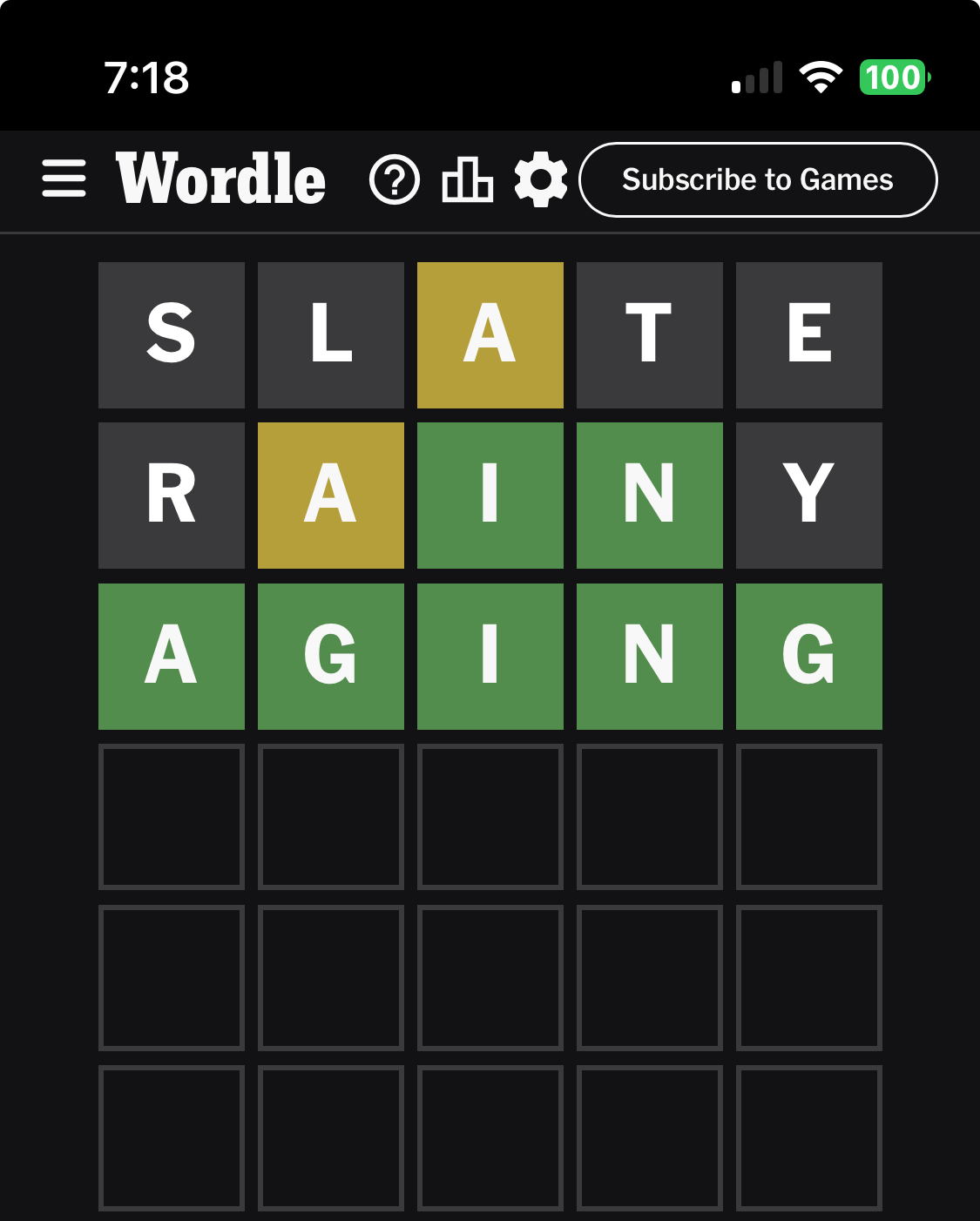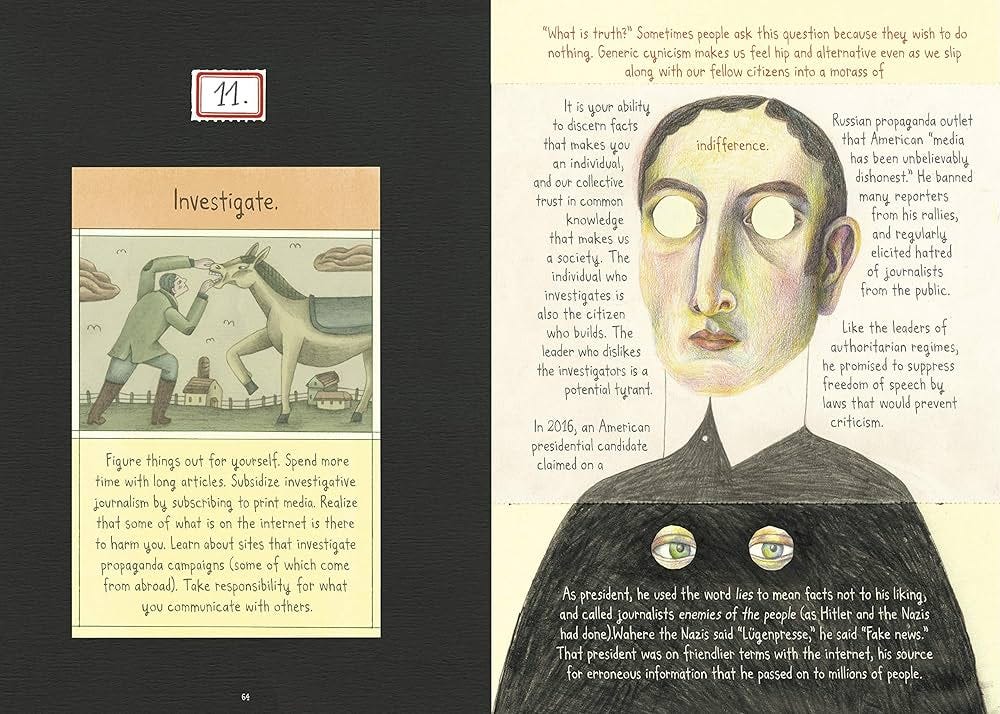Happy New Year to you all!
And Happy New Year of life to me. Tuesday was my birthday, which was a lovely day, despite its being everyone’s first day back to the routine after the holidays (spoiler: none of us felt ready) and also, Wordle was exceedingly rude:
Before I get to our thought for today, an announcement:
Anxious about 2024? Election already got you down?
Join me for a book discussion and some positive conspiring
I can’t even count how many people have told me they’re dreading 2024, specifically the 2024 election and potential aftermath. I agree. It does feel scary and fraught right now.
When I feel anxiety or despair, two of my best antidotes are relationships and action. We’re going to lean into both of those with a two-part roundtable discussion of the 2017 book On Tyranny: Twenty Lessons from the Twentieth Century by Professor Timothy Snyder. I try to read this slim book every year or two—it’s short enough to revisit often, and my library always has the audio version available, which you can knock out in less than two hours. It’s historical yet practical, bracing yet hopeful. We are the co-creators of our civic life together, and On Tyranny provides a practical guide, whether you resonate with his warnings or not.
We’re going to chat about the book, find wisdom for this moment, and come up with our own individual calls to action, however small and localized they may be. This will not be one-sided instruction from MaryAnn; this is intended as a conversation, so come with an openness to share, whether you’ve read the book or not.
Thursday, January 25 at noon Eastern (first half of book)
Thursday, February 1 at noon Eastern (second half of book)
Gatherings via Zoom; come to one or both
These gatherings are open to supporting subscribers, which you can become for as little as $5 a month, or $40 a year. Members and friends of Trinity Presbyterian Church, Herndon are eligible for complimentary gift subscriptions; just ask. Also, if you want to attend this gathering but are unable to pay, please be in touch.
The Zoom link for both gatherings can be found at the end of this week’s post for supporting subscribers:
Seven Alternatives to Resolutions
Happy New Year! For as much as I value personal growth, and I never met a self-improvement project I didn’t jump on, I’m not super big on resolutions. Think about the word itself: aside from congressional actions, and the quality of your phone’s screen, the only time you hear the word resolution is when it’s combined with “New Year.” Which means that here on January 3, if you haven’t made a resolution yet, or if you’ve already broken it, it’s all over.
And now, on with this week’s article:
It’s Not About Right and Wrong
There we were, a group of parents gathered in a classroom, therapists standing against the walls, waiting for the support group to begin. We had nothing in common, except that our kids had all struggled profoundly with their mental health. We were there to learn how we could support them as they got stronger and learned to cope with the anxiety and depression that had made it hard for them to function.
We avoided eye contact. But once the conversation began, halting at first, it turns out many of us had the same question: How did we get here? Or to be more blunt: What did we do wrong as parents?
One of the therapists cut to the chase. “You probably didn’t do anything wrong. This isn’t about right and wrong. But it’s possible you’ve been doing some things that haven’t been working. We’re going to help you learn some things that work.”
Over the months and years walking with our kids as they’ve struggled and grown, we’ve learned techniques and coping strategies and theoretical frameworks. But nothing has landed quite as hard with me as that statement has.
It’s not about right and wrong. It’s about what works.
That’s been important, first of all, because issues of right and wrong and blame get wrapped up in shame, and that’s not a productive stance when trying to help a loved one get well.
But more important, this idea helps me get thoughtfully strategic. That is, what outcome am I trying to achieve? And what offers the best chance to help me get there?
The other morning I was taking a teen to school who said with great worry that they hadn’t done any studying for an important test that needed to be retaken soon—potentially that very day. Despite this kid’s knowing for the entire winter break that the test was coming, and despite my having helped them set up a study schedule that allowed them to get everything done and still have plenty of time for holiday fun… and despite my telling them weeks ago that Future Them would be so much happier if Current Them did at least a little preparation before returning to school… they had done nothing.
I felt a flash of irritation. But more than that, Gentle Reader, I admit I felt… vindicated. And there’s something delicious about that feeling. I bet some of you know what I’m talking about, if you’re honest with yourself.
I had “I told you so” all locked and loaded. Because I was right.
But then I remembered that this kid was on their way to school for the first time in 17 days. And how hard that feeling is. (As I mentioned up top of this post, I felt it too.) At that moment, the goal was to help this kid have a productive day at school. So we dove into the next right thing: specifically, a few strategies for talking to the teacher and figuring out how to learn the material.
There would be plenty of time to troubleshoot some study habits. But not right then. Right then, I hope I communicated that I’m on my kid’s side. It wasn’t me versus them, it was the two of us versus the situation.
It’s not about right and wrong. It’s about what works.
I’ve been pondering this thought on multiple levels, all the way up to the realm of our public life together. I’m not saying there’s no such thing as a moral right and moral wrong. What I’m saying is it’s not enough to be right. The question is, what actions will get us where we need to go? There’s more to be said about that, but for now, talk to me: how does this idea connect with your life right now? What’s not working? What needs to change?
Steady on.






It’s not about right or wrong, it’s about what works. Those words took a heavy weight off my shoulders for a moment. It has been decades since my young daughters and I struggled because I thought I had to parent the way I was parented. It was the only model I really knew, and it wasn’t working for any of us. The more I tried, the more it backfired. Until I let it go. I looked at my daughters with a different lens. I looked at myself with a different lens. It took a lot of work and a lot of time to find what would work better. It wasn’t perfect, but it was better. Now they are grown and productive people. They are making their way and finding what works. And I love them and am part of their lives in different and good ways.
May we keep looking for what works. What is right for one is not right for another, what is wrong for one is not wrong for another. May we find what works as individuals, families, communities, and beyond.
Being with our kids, staying engaged through it all... Seems like that’s what matters most. Thanks for this MAMD!